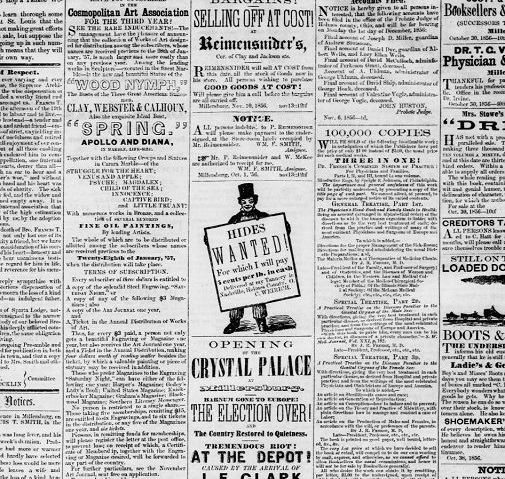Holmes County has a long historical record of newspapers
Once upon a time it wasnt The Bargain Hunter serving Holmes County residents with news and advertising. In fact Holmes County has a long historical record of newspapers dating all the way back to 1828 when W. McDowell founded the Millersburg Gazette. This paper was followed by Holmes County Farmer, which was considered the official paper of Holmes County throughout the latter half of the 1800s and into the 1900s, even though many other papers would come and go during this time.
The Farmer had strong political leanings toward the Democratic party. These leanings gave rise to another paper, the Holmes County Whig, which was first published in 1844 and would go on to become the Holmes County Republican. On Aug. 21, 1856, during the lead-up to the Civil War when the papers name officially changed to reflect the Republican party, the paper declared it was firmly opposed to slavery and for the preservation of the Union.
This led to a long, bitter war of words between the Farmer and the Republican. If you look through the pages of these papers, youll find writers taking shots at the opposing paper or at the views upheld by the opposing party. Reading through the pages, youll gain insights as to just how divided the nation was during the Civil War era.
These papers changed names over the years, what we call the Holmes County Farmer Hub, Candice Barnhart of the Holmes County Historical Society said. It was called the Holmes County Farmer off and on.
Throughout the 1800s and 1900s as the Farmer changed ownership, it would be known as the Farmer and Democrat, the Farmer, the Farmer Hub and Holmes County Hub. Today this paper is still in print but under a new name: The Holmes County Hub Shopper, owned by Dix Communications.
The Holmes County Republican went through a similar series of name changes, starting as the Holmes County Whig, then becoming the Holmes County Republican and finally being renamed to the Millersburg Republican in 1896. This paper ended publication in 1924 after years of battling for supremacy with the Farmer.
The war between these two papers was not decided by words but by money and viewership. Throughout the Civil War era Holmes County was predominately Democratic, so the Farmer was the more popular of the two papers. The Republican also had a string of financial problems that led to the papers publication stopping and starting throughout much of the 1800s. In fact the longest continuous printing run for the Republican was between 1870 and the papers final closure in 1924.
The Holmes County Historical Society maintains a collection of these papers. We have a few from the 1840s but not too many, Barnhart said. They are mostly the Holmes County Farmer and Farmer Hub. We also have a few of the 1880s Holmes County Republican papers.
These papers arent the only ones that have served Holmes County throughout the years. Nashville had The Nashville Times, a handwritten paper that first appeared in September 1872.
It is also rumored, although unconfirmed, that Glenmont had a paper.
We found amongst a cache of Farmer Hub issues a copy of a Glenmont paper. It is two or three pages, and it has the people and businesses that were in Glenmont, Barnhart said.
However, she also tells us that there is no record of this paper ever being published. It does appear to be authentic, perhaps a trial paper or an entirely new publication that is completely unknown to area historians.
Also of note is The Baltic American, which served Holmes, Coshocton and Tuscarawas counties. This paper was founded in 1898 by Charles Beach as The Tri-County Journal. The name changed to The Baltic American in 1905 and then The Tri-County American in 1924. It is unknown how long after 1924 this paper was published, but Ron Huprich from the Baltic Area Historical Society said the society has copies dated as late as 1925.
Right now we have about 70 copies of different issues of the paper that weve recovered from various people around Baltic, Huprich said.
In fact all of the historic Baltic papers have surfaced through donations. They were never archived in libraries or historical society archives. To that end the Baltic Area Historical Society hopes more people in the area will come forward with old copies of the Baltic papers.
We would at least like to borrow them, Huprich said. If people dont want to donate them to the Historical Society, we can digitally reproduce them and then give the original back.
So what is it that makes these historic newspapers valuable? It is more than just interesting reading material. Each of these papers contains local stories and historical record that hasnt been published anywhere else. Genealogy researchers will find a trove of information: births, marriage announcements, obituaries and more.
So if you have a collection of older papers in your attic, let your local historical society know because these documents are just one of the tools they can use to fill in the gaps in our historical knowledge.

